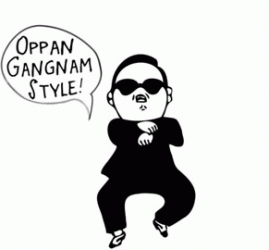Question D: After the class on sexual objectification, explain what you think about sexual objectification in K-pop
The success behind K-pop hides behind the extravagance of revealing outfits, cheesy smiles, catchy melodies, and seductive dances. In the K-pop industry, sexual objectification is very prominent within female artists by the way they are dressed and perceived within the lyrics of their songs. Therefore, the success of a K-pop idol completely relies on their image. Unfortunately, within K-pop, it purely embodies the idea of how “sex sells.” Today, women are commonly being sexualized and objectified in K-pop where societal pressure exists for these idols to be flawless. Thus, sexual objectification in K-pop illustrates disempowerment in women by exercising the pressure for them to conform to set beauty standards and traditional gender roles.
There is no doubt that in every K-pop music video there are certain images that female K-pop idols need to conform to. In the normative male gaze perception, there are strong desires for a woman’s long, smooth legs. Thus, many K-pop idols are to assimilate to this kind of perfect body perceived by the audience. In addition, plastic surgery is very common for female idols to attain that perfection. As Saeji argues in her article, many idols are chosen to be within a certain group and are controlled “with a carefully pre-prepared image under the tutelage of K-pop’s major entertainment companies” (Saeji 2013, 330). Ultimately, the entertainment companies are the powerhouse that determines how they should be in their everyday lives. Hence, this forces female K-pops artist to simply comply in order to enhance their career. As a result, sexual objectification within K-pop further disempowers women through the importance of conformity within set beauty standards.
On the other hand, Korea is still embodied as a very male-dominated society today. As K-pop being the cultural ambassador of Korea, they are forced to follow the ideals of traditional gender roles. This is shown in many music videos like “Dream Girls” from class which has exemplified gendered ideas that “manipulates young female idol’s femininity in order to meet socially prescribe role expectations in a male-dominated society” (Lin & Rudolf 2017, 28). By sexually objectifying women as “exotic sexual objects” this further results in women to be portrayed as “submissive, fragile, and innocent maidens” (Lin & Rudolf 2017, 28). Therefore, the practices of K-pop reinforces women to continue to execute these traditional gender roles.
The idea of “sex sells” is embedded within the practices of K-pop culture. It is shown in the evidence above that female artist groups are still consistently being sexually objectified in their music videos. As a result, sexual objectification is a technique that is not only used to achieve success and fame but to also realign the standards of beauty and traditional gender roles of women within the Korean culture.
Reference
Lin, Xi, and Robert Rudolf. “Does K-pop Reinforce Gender Inequalities? Empirical Evidence from a New Data Set.” Asian Women 33, no. 4 (2017): 27-54. doi:10.14431/aw.2017.12.33.4.27.
Saeji, Cedarbough T. “Juvenile Protection and Sexual Objectification: Analysis of the Performance Frame in Korean Music Television Broadcasts.” Acta Koreana 16, no. 2 (December 2013): 329-65. doi:10.18399/acta.2013.16.2.003.
Emily Chow


Thank you for sharing your opinions about sexual objectification. I also agree that sexual objectification plays a very important role in K-pop industry. We can see the ideas of sexual objectification in almost every music videos, especially for the girl groups. They usually wear mini shirts with short skirts showing their belly button and long skinny legs. These sexy appearances really attracted many male audiences. Whereas, the female audiences would be eager to follow these beauty standards through making up, dressing up or even doing plastic surgery. As what Emily mentioned above, the concepts of sexual objectification are also embedded into the lyrics of the songs. The dance or physical movements in music videos are the other way that show the ideas of sexual objectification.
On the other hand, some male groups also applied the concepts of sexual objectification in their music videos. Take one of the famous boy groups BigBang as an example, their music videos “Bae Bae” and “Loser” show that women were sexually objectified. The woman in “Loser” wearing a bikini had a very intimate action with T.O.P (one of the members of BigBang). This scene obviously showed that woman was used as a sexual object. Apart from this direct way showing sexual objectification, the ideas of sexual objectification can also be introduced metaphorically in music videos. T.O.P in “Bae Bae” ejected some white liquid with a syringe to a woman, which implied the beauty of that woman that is what the men desired for. In this case, the sexual objectification is expressed in a metaphoric way.
I think sexual objectification is a pretty good idea being used in K-pop music videos. This can show the beautiful side of the women around the world. However, I think it is not that great if it is being overused. Everyone nowadays can access internet easily and watch whatever they want on YouTube platform. Sexual objectification may bring a bad influence on the young kids and teenagers, because they may not have critical thinking yet and they cannot distinguish what is right and what is wrong. Therefore, I believe education on sexual objectification would be essential.
Nice job Emily. One quibble, when you have an in-text citation you should have it like this:
“Here is a quote” (Author year, page#).
So there is no . after the quote, and instead it goes after the in-text citation. That way we know what sentence the citation is part of.
It would also strengthen the essay to divide the conclusion into a separate paragraph instead of being part of the last body paragraph. Why don’t you fix it before the TAs grade the essay?
Hi Dr. Saeji,
Thank you for your feedback. I appreciate your time in reading my response!
Thanks,
Emily Chow
Hey, Emily. Thank you for sharing your argument to us! I totally agree with your argument about sexually objection. I also think sexually objection is a main part of K-pop industry. We always see K-pop MV uses sexually objection especially in girls group or female singer. Such as the Korean famous singer: Hyuna. Her K-pop MV are the typical sexually objection. Hyuna who has sexy and skinny body. In her MV from YouTube, she always wears short skirt and sling even naked to show her long legs and white skins. And she’s dancing in the MV, the wave of the body is so sexy as well. She will attract both male and female audiences. For male audiences, they may be fascinated with Hyuna and let her becomes their goddess. For female audiences, they may let Hyuna as their goal. Girls who is more fat when they see Hyuna may goes to gym to set their body to become more beautiful. Or even do the plastic surgery as Cherry said above.
I also think male or male groups can handle sexual objection in their music video. For example, our group’s idol PSY. His video music is crazy. There are lots of dancing part and there is a music video called Hangover. This video has lots of scenes that PSY is dancing with girls, and those girls’ dressing are sexy and they show their legs and butts in the dancing. PSY also has a music video cooperated with Hyuna. In that video, Hyuna is dancing and the background music is Gangnam Style. Hyuna’s dancing and PSY’s music make that video become more sexually objection. As Emily said, the concept of sexual objections also can have embedded into lyrics of songs. Hyuna and PSY’s video is a good example of Emily’s concept, they let Gangnam Style become more success because of their corporation in sexually objection.
Sexually objection is a good use in music video, it can make people become more excited. It given a new concept about female and male in their music video. Female can spend more times on set their bodies, male as well. Then, everybody become good.
Hey Emily,
Thanks for posting your thoughts on sexual objectification. You provided a few insightful points throughout the post and I would like to talk about it. It is undeniably true that K-pop idols are more famous or successful by portraying themselves as sex objects. This idea of viewing woman as sexual stimulus is very common among Asian countries, especially with nations exporting local culture through entertainment. Just like you mentioned, K-pop companies reinforced the idea of sexual objectification as a way to boost viewerships and audience count. It doesn’t look like these K-pop entertainment companies provided the appropriate ethics and freedom for every female idol in the industry, their choice of being “sexy” is overruled by the company which owns the artist instead of the individual. Even though females with long, smooth and slim legs can be seen as more attractive, I believe the idols themselves should have to the final decision on whether they want to be objectified as “sex dolls”.
I don’t believe any Asian countries would accept such a drastic change of view towards gender norms. Chinese traditions essentially decided to place women as inferior to male and only viewed females as caretakers and reproducers. It’ll be challenging for Korea to assimilate gender equality into K-pop because every person involved in producing K-pop has been influenced by traditional ideas, ideas which discriminate and dehumanize females.